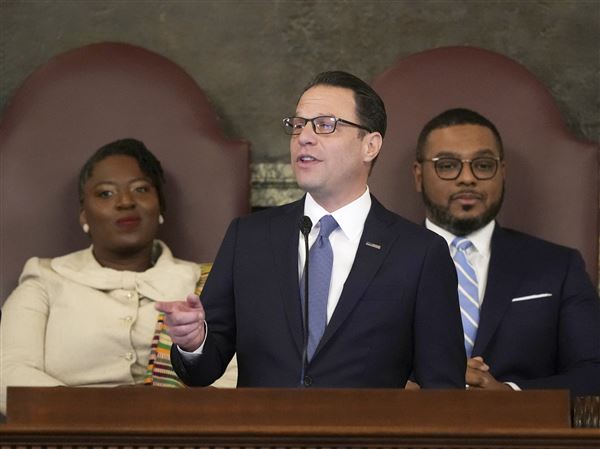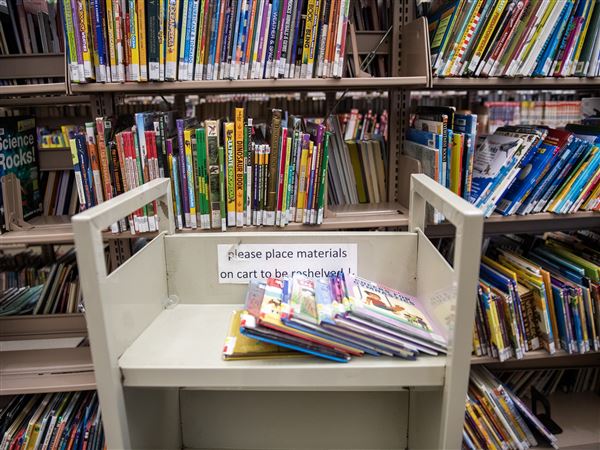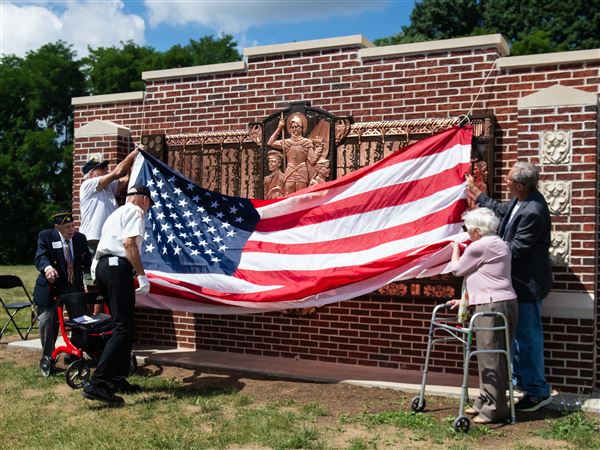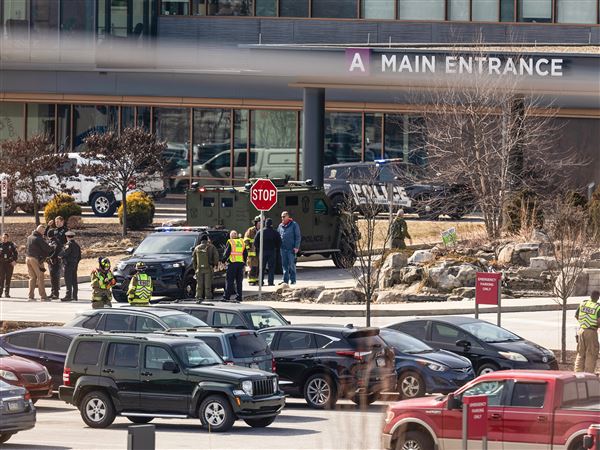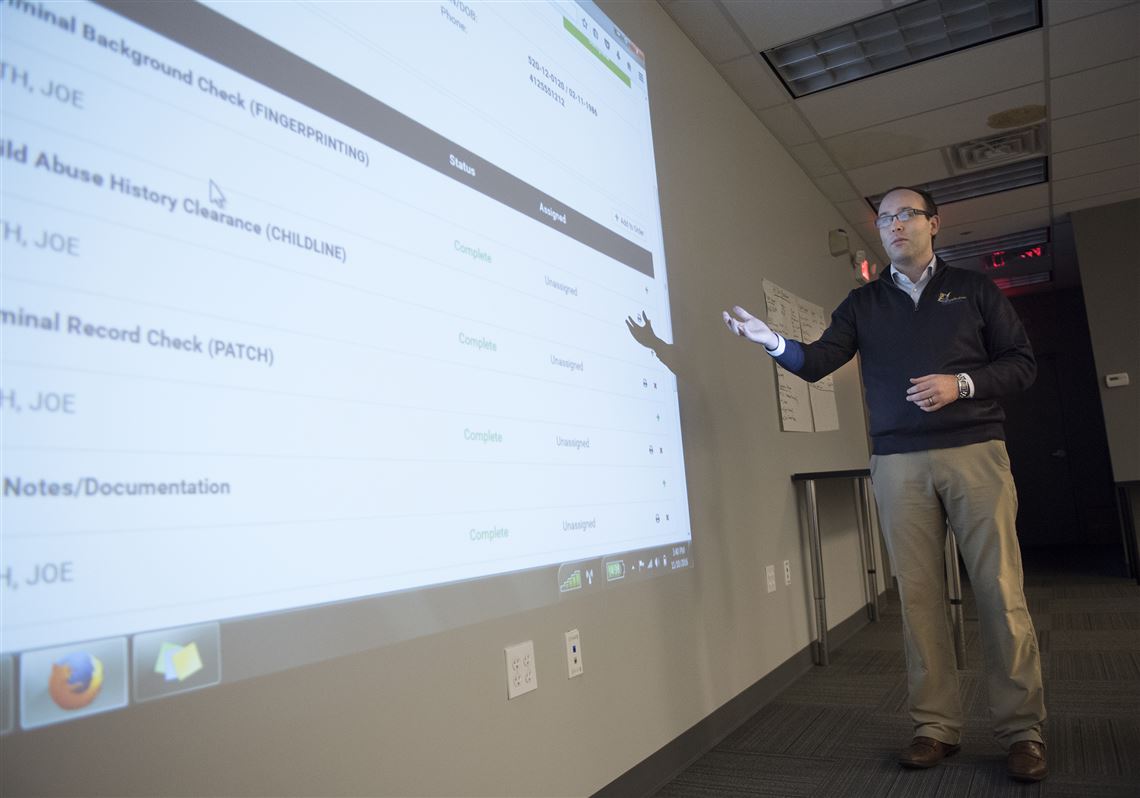Application Verification, a 6-year-old East Pittsburgh technology business, has built employee screening systems for 300 organizations ranging from Westinghouse Electric to oil and gas firms that hired thousands of workers during the shale drilling boom.
So it didn’t surprise David Reed, chief operating officer, when a group of local nonprofits in 2014 sought its help in developing an efficient — and affordable — way to handle background checks for the crowds of people who volunteer to help out with charity work.
“It’s an administrative burden for these organizations to have to go to all their volunteers and get them to do the clearances,” said Mr. Reed.
Schools, churches and other organizations have seen government-mandated background checks become even more stringent in Pennsylvania following the Jerry Sandusky child-abuse case at Penn State University.
Since the former college football coach was convicted of sexually molesting young boys whom he met through his own charitable organization, the state Legislature and Gov. Tom Wolf have overhauled and updated legislation which requires many employees and volunteers to obtain criminal background clearances from the FBI, the state police and the state Department of Public Welfare, and to have those clearances updated every five years.
As the process became more intensive, Kate Dewey, president of the Forbes Funds, an agency that helps nonprofits with management issues, spearheaded the group that tapped Application Verification for help.
To spur on the effort, she encouraged the company to enter the 2015 UpPrize, a competition in which entrepreneurs are challenged to provide innovative solutions to social and community problems.
It worked. As one of eight finalists that emerged from more than 100 entries, Application Verification won $10,000. The company combined that with some of its own funding to develop a background clearance system for United Way of Southwestern Pennsylvania.
United Way oversees 10,000 volunteers annually — many of whom work with children.
After collaborating for the past year to create and test the screening system, United Way and Application Verification have launched a one-year deal to pilot it for two of United Way’s major volunteer initiatives: the Money in Your Pocket Coalition free tax preparation program; and Be a Middle School Mentor. Together those programs use the services of more than 1,000 volunteers.
“We’re really trying to mobilize volunteers to do the most good in the community,” said Lois Mufuka Martin, chief volunteer engagement officer at the United Way.
The time and paperwork involved in distributing clearance forms to prospective volunteers, waiting for the results from government agencies and then updating the clearances to comply with the law can be overwhelming for nonprofits with limited budgets and personnel, she said.
Using Application Verification’s ProVerify product, United Way only needs to send a web-based link to prospective volunteers. After the individuals fill out the online forms, the forms are automatically uploaded to government agencies responsible for providing clearances.
United Way is then notified of the results and the data stored in a cloud computing center so that it can be updated when required.
The system uses the same basic software used by Application Verification’s for-profit clients, said Mr. Reed.
Even before it entered the UpPrize, the company had decided to make a significant investment in tailoring its product to help organizations screen volunteers. After meeting with Ms. Dewey two years ago and learning there was a viable market among nonprofits, the company invested $260,000 in configuring the product for volunteer clearances.
When it won $10,000 at UpPrize, it combined that with another $75,000 of its own funds to customize it for United Way.
“We put the money out there knowing there was a niche in child protective services for us to get into,” said Mr. Reed.
Mr. Reed acknowledged that his company, unlike some UpPrize competitors, was well beyond the startup stage.
Application Verification is an affiliate of Gregg Services, also based in East Pittsburgh, which provides security services for companies and government agencies; and operates employee staffing and real estate development businesses. The parent company’s sales are more than $12.5 million annually, Mr. Reed said.
“We didn’t need the UpPrize money to fund our business and put our next meal on the table,” he said. “This was a way to give back. Before UpPrize, we wouldn’t have looked at the nonprofit sector as a viable way to sell technology.”
The company is now offering the system to other nonprofits and schools. The average monthly cost for nonprofits with fewer than 500 volunteers ranges from $100 to $500, plus the cost of clearances, said Mr. Reed.
United Way gets it at a discount since it helped develop the pilot system.
“This opportunity is exactly what the UpPrize is about,” said Ms. Dewey. “It’s using technology and nonprofit input to create solutions that really make a significant difference.”
In the next round of UpPrize, entrants will compete for a total $700,000 in funding and will respond to one of two challenges: developing technology that will improve products and services nonprofits provide to the region’s most vulnerable residents; or creating ways to provide more healthy food to low-income areas and people in need.
The deadline to apply is Nov. 30 and the final pitch competition in front of a live audience will be held in March.
In its first year, UpPrize was sponsored by the Forbes Funds and BNY Mellon Foundation. Both will provide money and support for the next competition, along with Comcast and Bridgeway Capital, a Downtown-based loan fund for small businesses.
For information or to enter, go to www.upprize.org.
Joyce Gannon: jgannon@post-gazette.com or 412-263-1580.
First Published: November 17, 2016, 3:00 p.m.
